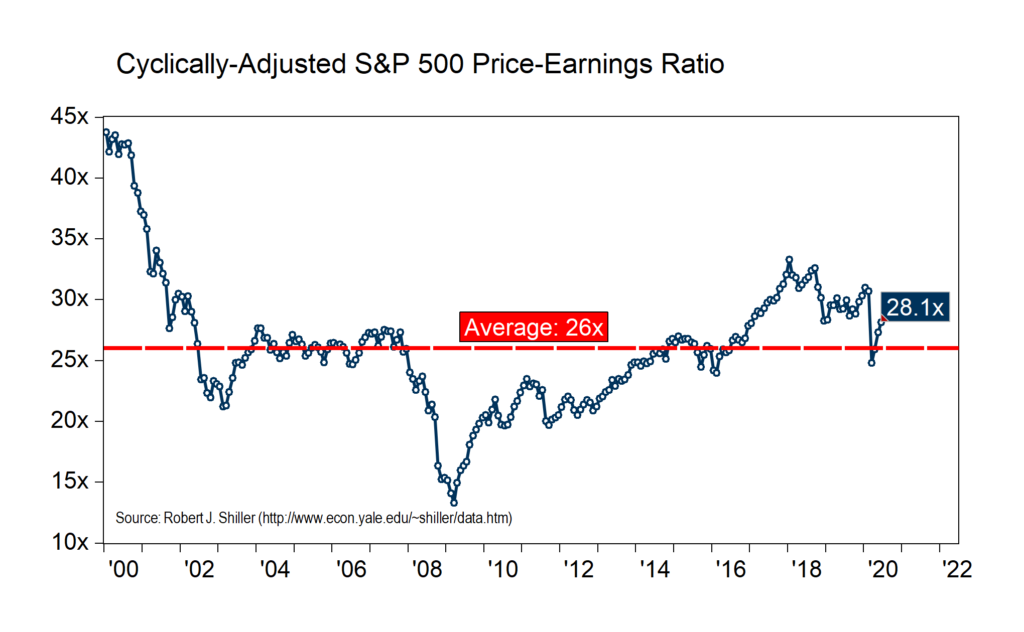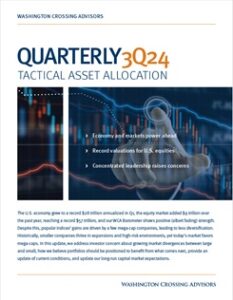Valuation During Recession
This week closes out a most volatile quarter. Stocks are on track to rise by the most during the quarter (+19% as of this writing) since 2009 despite a sharp contraction in the economy. The powerful rally leaves many wondering about valuations amid a pandemic and recession.
Even though price is important, we should avoid relying too heavily on standard valuation metrics such as price-to-earnings multiples because this economy is far too volatile to assess business prospects accurately and because stock values are determined mostly by long-run, rather than short-run, earnings power.
Price is Important
Overpaying for stocks can take a toll on a portfolio. Ask any investor who bought and held technology stocks in the first few years following 1999. From the Nasdaq’s peak in March 2000 through the October 2002 bottom, the index lost 77%. While the Nasdaq has turned in a stellar performance since the first years of the millennium were difficult ones for tech investors.
Bull markets tend to blind even the savviest investor from problems in valuation. When making money in such markets, it is easy to stay too long at the party. The longer the period of gains, the easier it becomes to cling to the beliefs formed during the good times. Having to change opinions, fear of missing the next run, or the prospect of paying taxes can lead to complacency. Our desire to avoid such traps is why we incorporate valuation into our estimation of future return expectations.
Beware the Common P/E Ratio
Even though valuation is important, we should avoid relying too much on traditional multiples like price-to-earnings (P/E) ratios in this environment. The current climate is far too volatile to assess business prospects properly.
According to the Federal Reserve Bank of Atlanta’s “GDP Now” model, the U.S. economy contracted at a 40% annualized pace in the last quarter. Analysts expect S&P 500 company profits to also decline over 40% from a year earlier. The shock of the virus and shutdown creates massive uncertainty and turbulence in current earnings, making it hard to value stocks on simple price-earnings ratios alone.
Looking Beyond the Cliff
What if we just wrote off 2020 and 2021’s earnings entirely? At the start of the year, long before Covid-19 was a household word, analysts expected S&P 500 profits of $180 in 2020 and $200 in 2021. If we assume those earnings evaporate entirely, $380 of value would disappear. The S&P 500 would be worth $380 less than the $3,400 price attained on February 14, all else being equal.
But we do not expect S&P earnings to fall all the way to zero this year and next, and we do hope and expect the world will recover from the virus. Moreover, increasingly meager interest rates encourage higher valuations on S&P 500 earnings out into the future. After the shock of the second quarter earnings cliff fades, we expect that most investors will focus on earnings in 2021, 2022, and 2023. This perspective is appropriate since stocks should rightly be valued on long-run, rather than short-term prospects.
A Better Way?
Keeping a long-run perspective means not over-reacting to short-term swings in earnings. A “cyclically-adjusted” measure of earnings power can help us maintain such a perspective. Professor Robert Shiller of Yale provides data in a spreadsheet that calculates a measure of S&P 500 earnings that smooths out cyclical noise. By averaging and earnings over a full economic cycle (10-years), he estimates a market price-earnings ratio free of the profit cycle (chart, below). This valuation ratio is commonly referred to as a “CAPE” ratio (cyclically-adjusted price-earnings).

Notice that today’s CAPE ratio above (28.1x) now sits above the 20-year average (26x). This premium suggests that the S&P 500 is about 8% “overvalued” compared to the historical average. Since we believe that markets are mostly rational and valuations tend to revert to averages over time, we need to subtract something from our return expectation to account for above-average valuations. If the 8% premium valuation is spread out over our 10-year forecast period, it will detract about 0.8% per year from return. It is worth noting that the degree of “overvaluation” based on today’s CAPE ratio of 28.1x lower than in 2018 when the CAPE ratio hit peaked at 33x and far lower than the sky-high 43x multiple hit in March 2000.
Conclusion
So it is clear that although valuation is important, investors should avoid relying on traditional multiples in this environment for two reasons. First, today’s economy is not a typical operating environment for most companies and earnings reported during the pandemic are not representative of earnings power under normal conditions. But most importantly, markets are most appropriately valued on long-run, not short-run, earnings power.
This coming earnings season is likely to offer jaw-dropping declines in earnings (-40% or more). It might be tempting to conclude that stocks are significantly overpriced based on a standard price-earnings ratio with deflated earnings in the denominator. But we think this is a mistake because we believe that valuations should focus on longer-term earnings prospects. A cyclical adjustment to earnings provides a more balanced way to start thinking about today’s stock market’s valuation.
We are not saying that valuations do not matter. They do, but at the same time, it is essential to separate cyclical swings from real, underlying earnings power.
Disclosures:
The Washington Crossing Advisors’ High Quality Index and Low Quality Index are objective, quantitative measures designed to identify quality in the top 1,000 U.S. companies. Ranked by fundamental factors, WCA grades companies from “A” (top quintile) to “F” (bottom quintile). Factors include debt relative to equity, asset profitability, and consistency in performance. Companies with lower debt, higher profitability, and greater consistency earn higher grades. These indices are reconstituted annually and rebalanced daily. For informational purposes only, and WCA Quality Grade indices do not reflect the performance of any WCA investment strategy.
Standard & Poor’s 500 Index (S&P 500) is a capitalization-weighted index that is generally considered representative of the U.S. large capitalization market.
The S&P 500 Equal Weight Index is the equal-weight version of the widely regarded Standard & Poor’s 500 Index, which is generally considered representative of the U.S. large capitalization market. The index has the same constituents as the capitalization-weighted S&P 500, but each company in the index is allocated a fixed weight of 0.20% at each quarterly rebalancing.
The information contained herein has been prepared from sources believed to be reliable but is not guaranteed by us and is not a complete summary or statement of all available data, nor is it considered an offer to buy or sell any securities referred to herein. Opinions expressed are subject to change without notice and do not take into account the particular investment objectives, financial situation, or needs of individual investors. There is no guarantee that the figures or opinions forecast in this report will be realized or achieved. Employees of Stifel, Nicolaus & Company, Incorporated or its affiliates may, at times, release written or oral commentary, technical analysis, or trading strategies that differ from the opinions expressed within. Past performance is no guarantee of future results. Indices are unmanaged, and you cannot invest directly in an index.
Asset allocation and diversification do not ensure a profit and may not protect against loss. There are special considerations associated with international investing, including the risk of currency fluctuations and political and economic events. Changes in market conditions or a company’s financial condition may impact a company’s ability to continue to pay dividends, and companies may also choose to discontinue dividend payments. Investing in emerging markets may involve greater risk and volatility than investing in more developed countries. Due to their narrow focus, sector-based investments typically exhibit greater volatility. Small-company stocks are typically more volatile and carry additional risks since smaller companies generally are not as well established as larger companies. Property values can fall due to environmental, economic, or other reasons, and changes in interest rates can negatively impact the performance of real estate companies. When investing in bonds, it is important to note that as interest rates rise, bond prices will fall. High-yield bonds have greater credit risk than higher-quality bonds. Bond laddering does not assure a profit or protect against loss in a declining market. The risk of loss in trading commodities and futures can be substantial. You should therefore carefully consider whether such trading is suitable for you in light of your financial condition. The high degree of leverage that is often obtainable in commodity trading can work against you as well as for you. The use of leverage can lead to large losses as well as gains. Changes in market conditions or a company’s financial condition may impact a company’s ability to continue to pay dividends, and companies may also choose to discontinue dividend payments.
All investments involve risk, including loss of principal, and there is no guarantee that investment objectives will be met. It is important to review your investment objectives, risk tolerance, and liquidity needs before choosing an investment style or manager. Equity investments are subject generally to market, market sector, market liquidity, issuer, and investment style risks, among other factors to varying degrees. Fixed Income investments are subject to market, market liquidity, issuer, investment style, interest rate, credit quality, and call risks, among other factors to varying degrees.
This commentary often expresses opinions about the direction of market, investment sector, and other trends. The opinions should not be considered predictions of future results. The information contained in this report is based on sources believed to be reliable, but is not guaranteed and not necessarily complete.
The securities discussed in this material were selected due to recent changes in the strategies. This selection criterion is not based on any measurement of performance of the underlying security.
Washington Crossing Advisors, LLC is a wholly-owned subsidiary and affiliated SEC Registered Investment Adviser of Stifel Financial Corp (NYSE: SF). Registration with the SEC implies no level of sophistication in investment management.



